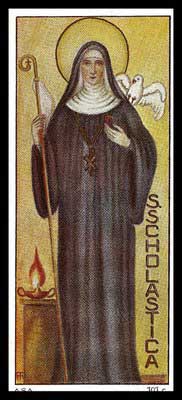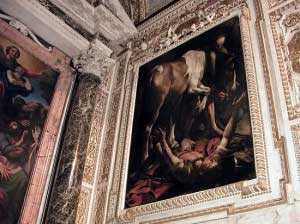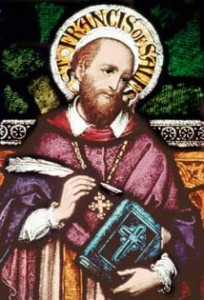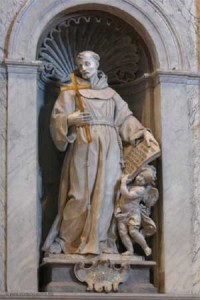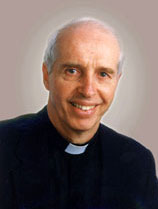
First Reading and Psalm
Leviticus 13:1-2, 44-46
Psalm 32:1bb-2, 5, 11
The Second Reading, 1 Corinthians 10:31; 11:1
The Gospel, Mark 1:40-45
Tags: catholic, catholic podcast, catholic prayer, cathollc spirituality, Fr. Francis Martin, Francis Martin, gospel of mark, Psalm Leviticus
This entry was posted on Saturday, February 11th, 2012 at 7:50 am
You can follow any responses to this entry through the RSS 2.0 feed.
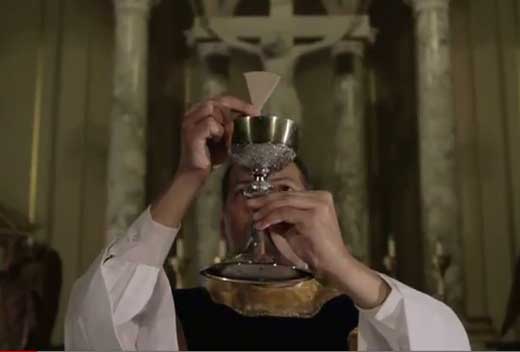 This video is BREATHTAKING. A POWERFUL CELEBRATION OF PRIESTHOOD. All praise and thanks to you, Our Loving Father in Heaven, for the great gift of Holy Orders and in particular for the priesthood! Thank you to all at the Institute for Priestly Formation.
This video is BREATHTAKING. A POWERFUL CELEBRATION OF PRIESTHOOD. All praise and thanks to you, Our Loving Father in Heaven, for the great gift of Holy Orders and in particular for the priesthood! Thank you to all at the Institute for Priestly Formation.
Tags: A Celebration, catholic, catholic podcast, catholic prayer, cathollc spirituality, institute for priestly formation, priesthood
This entry was posted on Saturday, February 11th, 2012 at 7:36 am
You can follow any responses to this entry through the RSS 2.0 feed.
Litany of Saint Scholastica
Origin of this litany unknown, but in all details it follows the constant practice and pattern of Medieval litanies; this translation is from St. Benedict’s Manual (1875, 1879, Frederick Pustet). Note the invocation “prevented by the grace of Christ Our Lord,” a now archaic use of “prevented” but which once meant to be helped or succored.
Lord have mercy on us. Lord have mercy on us. Christ have mercy on us. Christ have mercy on us. Lord have mercy on us. Lord have mercy on us. Christ hear us. Christ graciously hear us.
God the Father of Heaven, Have mercy on us. God the Son, Redeemer of the world, Have mercy on us. God the Holy Ghost, Have mercy on us. Holy Trinity, one God, Have mercy on us.
Holy Mary, Pray for us. Holy Mother of God, Pray for us. Holy Virgin of virgins, Pray for us. Saint Scholastica, Pray for us. St. Scholastica, true sister of St. Benedict, Pray for us. St. Scholastica, chosen by God from eternity, Pray for us. St. Scholastica, prevented by the grace of Christ Our Lord, Pray for us. St. Scholastica, consecrated to God from thy infancy, Pray for us. St. Scholastica, always a virgin incorrupt, Pray for us. St. Scholastica, espoused to Jesus Christ, Pray for us. St. Scholastica, scholar of the Holy Ghost, Pray for us. St. Scholastica, mirror of innocence, Pray for us. St. Scholastica, model of perfection, Pray for us. St. Scholastica, pattern of virtues, Pray for us. St. Scholastica, glory of the monastic life, Pray for us. St. Scholastica, mother of numberless virgins, Pray for us. St. Scholastica, imitator of the angelic life, Pray for us. St. Scholastica, full of faith in God, Pray for us. St. Scholastica, replenished with hope of the goods of heaven, Pray for us. St. Scholastica, ever burning with the love of thy Spouse, Pray for us. St. Scholastica, resplendent with humility, Pray for us. St. Scholastica, trusting as a daughter in the Lord, Pray for us. St. Scholastica, intent on prayer, Pray for us. St. Scholastica, quickly heard by the Lord, Pray for us. St. Scholastica, famed for the praise of perseverance, Pray for us. St. Scholastica, who didst enter the courts of Heaven in the form of a dove, Pray for us. St. Scholastica, who dost now follow the Lamb whithersoever He goeth, Pray for us. St. Scholastica, who dost rejoice in delights of thy Spouse for ever, Pray for us. St. Scholastica, adorned with a crown of glory, Pray for us. St. Scholastica, advocate with God of those who invoke thee, Pray for us. St. Scholastica, generous patron of those who imitate thee, Pray for us. St. Scholastica, holy and innocent virgin, Pray for us.
We sinners: Beseech thee, Saint Scholastica, to hear us.
That thou deign to help us, by thy most holy and efficacious prayers to God, We beseech thee, hear us. That thou deign to cherish and preserve, by thy protection, the Benedictine Order (and this monastery) and all who dwell therein, We beseech thee, hear us. (That thou admit us into the number of thy children,) We beseech thee, hear us. That thou deign to raise up, increase, and preserve our devotion toward thee, We beseech thee, hear us. (That thou deign to preserve in us the perfect observance of the Rule of thy blessed brother, our most holy Father Saint Benedict,) We beseech thee, hear us. That thou deign by thy supplications, to moisten the dryness of our hearts with the dew of heavenly grace, We beseech thee, hear us. That, by thy intercession, thou mayest eternally unite us to Christ, the Spouse of our souls, We beseech thee, hear us. That thou mayest lead us to eternal joys, and to Jesus, (our most sweet Spouse), We beseech thee, hear us. That thou wouldst vouchsafe to hear us, We beseech thee, hear us.
Lamb of God, Who takest away the sins of the world: Spare us, O Lord. Lamb of God, Who takest away the sins of the world: Graciously hear its, O Lord. Lamb of God, Who takest away the sins of the world: Have mercy on us.
V. Pray for us, O holy Virgin Scholastica: R. That we may be made worthy of the promises of Christ.
Let us pray. O God, Who, to show the innocence of her life, didst cause the soul of Thy blessed Virgin Scholastica to ascend to Heaven in the form of a dove: grant, we beseech Thee, by her merits and prayers, that we may live so innocently, as to deserve to arrive at eternal joys. Through Jesus Christ, Thine only-begotten Son, Our Lord, Who with Thee and the Holy Ghost liveth and reigneth, God, for ever and ever. R. Amen.
Prayer Source: Kyrie Eleison — Two Hundred Litanies by Benjamin Francis Musser O.F.M., The Magnificat Press, 1944
Tags: catholic, catholic podcast, catholic prayer, cathollc spirituality, Saint Scholastica, st scholastica
This entry was posted on Friday, February 10th, 2012 at 12:39 am
You can follow any responses to this entry through the RSS 2.0 feed.
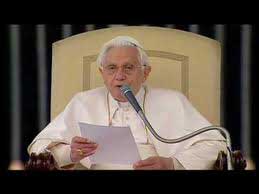
Vatican City, 8 February 2012 (VIS) – The prayer of Jesus at the moment of His death, as narrated by St. Mark and St. Matthew was the theme of Benedict XVI’s catechesis during his general audience, held this morning in the Paul VI Hall.
Yet, the Holy Father asked, “what is the meaning of Jesus’ prayer? The cry addressed to the Father: ‘my God, my God, why have you 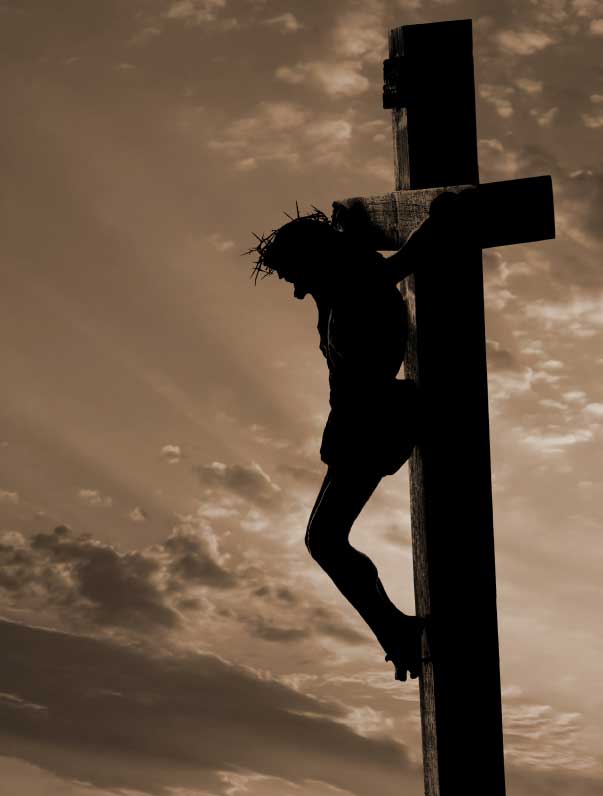 forsaken me?'” He explained that “the words Jesus addresses to the Father are the beginning of Psalm 22, in which the Psalmist expresses the tension between, on the one hand, being left alone and, on the other, the certain knowledge of God’s presence amongst His people. … The Psalmist speaks of a ‘cry’ to express all the suffering of his prayer before the apparently absent God. At moments of anguish prayer becomes a cry.
forsaken me?'” He explained that “the words Jesus addresses to the Father are the beginning of Psalm 22, in which the Psalmist expresses the tension between, on the one hand, being left alone and, on the other, the certain knowledge of God’s presence amongst His people. … The Psalmist speaks of a ‘cry’ to express all the suffering of his prayer before the apparently absent God. At moments of anguish prayer becomes a cry.
“This also happens in our own relationship with the Lord”, the Pope added. “In the face of difficult and painful situations, when it seems that God does not hear, we must not be afraid to entrust Him with the burden we are carrying in our hearts, we must not be afraid to cry out to Him in our suffering”.
“Jesus prays at the moment of ultimate rejection by man, at the moment of abandonment. However, He is aware that God the Father is present even at the instant in which He is experiencing the human drama of death. Yet nonetheless, a question arises in our hearts: how is it possible that such a powerful God does not intervene to save His Son from this terrible trial?”
The Holy Father explained that “it is important to understand that the prayer of Jesus is not the cry of a person who meets death with desperation, nor that of a person who knows he has been abandoned. At that moment Jesus appropriates Psalm 22, the Psalm of the suffering people of Israel, at that moment He takes upon Himself not only the suffering of His people, but also that of all men and women oppressed by evil. … And He takes all this to the heart of God in the certainty that His cry will be heard in the resurrection. … His is a suffering in communion with us and for us, it derives from love and carries within itself redemption and the victory of love.
“The people at the foot of Jesus’ cross were unable to understand, they thought His cry was a supplication to Elijah. … We likewise find ourselves, ever and anew, facing the ‘today’ of suffering, the silence of God – many times we say as much in our prayers – but we also find ourselves facing the ‘today’ of the Resurrection, of the response of God Who took our sufferings upon Himself, to carry them with us and give us the certain hope that they will be overcome”.
“In our prayers”, the Holy Father concluded, “let us bring God our daily crosses, in the certainty that He is present and listens to us. The cry of Jesus reminds us that in prayer we must cross the barrier of ‘self’ and our own problems, and open ourselves to the needs and sufferings of others. May the prayer of the dying Jesus on the cross teach us to pray with love for so many brothers and sisters who feel the burden of daily life, who are experiencing moments of difficulty, who suffer and hear no words of comfort, that they may feel the love of God Who never abandons us.
Tags: catholic, catholic podcast, catholic prayer, cathollc spirituality, pope benedict xvi, psalm 22
This entry was posted on Wednesday, February 8th, 2012 at 8:21 am
You can follow any responses to this entry through the RSS 2.0 feed.

First Reading and Psalm
Job 7:1-4, 6-7
Psalm 147:1-2, 3-4, 5-6
Second Reading, 1 Corinthians 9:16-19, 22-23
The Gospel, Mark 1:29-39
Tags: catholic, catholic podcast, catholic prayer, cathollc spirituality, gospel of mark
This entry was posted on Friday, February 3rd, 2012 at 7:29 am
You can follow any responses to this entry through the RSS 2.0 feed.
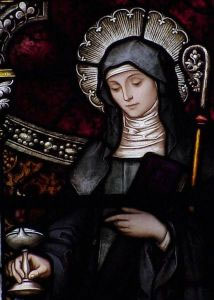 St. Brigid of Kildare, an extraordinary woman of faith, who was known for the beauty of her heart.
St. Brigid of Kildare, an extraordinary woman of faith, who was known for the beauty of her heart.
Daughter of Dubtach, pagan Scottish king of Leinster, and Brocca, a Christian Pictish slave who had been baptized by Saint Patrick. Just before Brigid’s birth, her mother was sold to a Druid landowner. Brigid remained with her mother till she was old enough to serve her legal owner Dubtach, her father.
She grew up marked by her high spirits and tender heart, and as a child, she heard Saint Patrick preach, which she never forgot. She could not bear to see anyone hungry or cold, and to help them, often gave away things that were Dubtach’s. When Dubtach protested, she replied that “Christ dwelt in every creatureâ€. Dubtach tried to sell her to the King of Leinster, and while they bargained, she gave a treasured sword of her father’s to a leper. Dubtach was about to strike her when Brigid explained she had given the sword to God through the leper, because of its great value. The King, a Christian, forbade Dubtach to strike her, saying “Her merit before God is greater than oursâ€. Dubtach solved this domestic problem by giving Brigid her freedom.
Brigid’s aged mother was in charge of her master’s dairy. Brigid took charge ,and often gave away the produce. But the dairy prospered under her (hence her patronage of milk maids, dairy workers, cattle, etc.), and the Druid freed Brigid’s mother.
Brigid returned to her father, who arranged a marriage for her with a young bard. Bride refused, and to keep her virginity, went to her Bishop, Saint Mel of Ardagh, and took her first vows. Legend says that she prayed that her beauty be taken from her so no one would seek her hand in marriage; her prayer was granted, and she regained her beauty only after making her vows. Another tale says that when Saint Patrick heard her final vows, he mistakenly used the form for ordaining priests. When told of it he replied, “So be it, my son, she is destined for great things.â€
Her first conven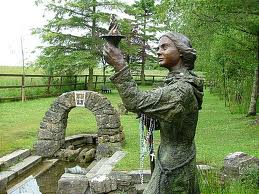 t started c.468 with seven nuns. At the invitation of bishops, she started convents all over Ireland. She was a great traveller, especially considering the conditions of the time, which led to her patronage of travellers, sailors, etc. Brigid invented the double monastery, the monastery of Kildara, which means Church of the Oak, that she ran on the Liffey river being for both monks and nuns. Saint Conleth became its first bishop; this connection and the installation of a bell that lasted over 1000 years apparently led to her patronage of blacksmiths and those in related fields.
t started c.468 with seven nuns. At the invitation of bishops, she started convents all over Ireland. She was a great traveller, especially considering the conditions of the time, which led to her patronage of travellers, sailors, etc. Brigid invented the double monastery, the monastery of Kildara, which means Church of the Oak, that she ran on the Liffey river being for both monks and nuns. Saint Conleth became its first bishop; this connection and the installation of a bell that lasted over 1000 years apparently led to her patronage of blacksmiths and those in related fields.
Litany of Saint Brigid of Kildare
This old litany is of unknown origin.
Lord, have mercy on us. Lord, have mercy on us. Christ, have mercy on us. Christ, have mercy on us. Lord, have mercy on us. Lord, have mercy on us. Christ, hear us. Christ, graciously hear us.
God the Father of Heaven, Have mercy on us. God the Son, Redeemer of the world, Have mercy on us. God the Holy Ghost, Have mercy on us. Holy Trinity, one God, Have mercy on us.
Holy Mary, Queen of virgins, Pray for us. Saint Brigid, Pray for us. Mary of the Gael, Pray for us. St. Brigid, Patroness of Ireland, Pray for us. St. Brigid, shining light of virtue and sanctity, Pray for us. St. Brigid, consecrated spouse of Jesus Christ, Pray for us. St. Brigid, foundress of Kildare, Pray for us. St. Brigid, cornerstone of the monastic institute in the Isle of Saints, Pray for us. St. Brigid, great model of Irish virgins, Pray for us. St. Brigid, mother of religious, Pray for us. St. Brigid, pattern of religious perfection, Pray for us. St. Brigid, intercessor for the Irish Church, Pray for us. St. Brigid, mediatrix for the Irish race, Pray for us. St. Brigid, protectress of the holy faith planted by Saint Padrig, Pray for us. St. Brigid, enjoying with him the clear vision of God, Pray for us. St. Brigid, whose one desire was to satisfy the poor, drive out hardship, and spare every miserable man, Pray for us.
Lamb of God, Who takest away the sins of the world: Spare us, O Lord. Lamb of God, Who takest away the sins of the world: Graciously hear us, O Lord. Lamb of God, Who takest away the sins of the world: Have mercy on us, O Lord.
Christ, hear us. Christ, graciously hear us.
V. Pray for us, O glorious Saint Brigid: R. That we may be made worthy of the promises of Christ.
Let us pray. O God, Who dost rejoice with the memory of the blessed Saint Brigid, Thy virgin and abbess, mercifully grant that we may be assisted by her merits, by whose chastity we are illumined. Through Jesus Christ Thy Son Our Lord. R. Amen.
Tags: catholic, catholic podcast, catholic prayer, cathollc spirituality, litany of st. brigid of kildare, Saint Patrick, st brigid of kildare, St. Brigid, woman of faith
This entry was posted on Wednesday, February 1st, 2012 at 12:49 am
You can follow any responses to this entry through the RSS 2.0 feed.

First Reading and the Psalm
Deuteronomy 18:15-20
Psalm 95:1-2, 6-7, 8-9
Second Reading, 1 Corinthians 7:32-35
The Gospel, Mark 1:21-28
Tags: catholic, catholic podcast, catholic prayer, cathollc spirituality, Fr. Francis Martin, gospel of mark
This entry was posted on Friday, January 27th, 2012 at 6:51 am
You can follow any responses to this entry through the RSS 2.0 feed.
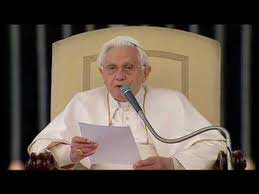
VATICAN CITY, 25 JAN 2012 (VIS) –
Benedict XVI dedicated his catechesis during this morning’s general audience to Christ’s priestly prayer during the Last Supper, as narrated in chapter 17 of the Gospel of St. John. In order to understand this prayer “in all its immense richness”, said the Pope, it is important to see it in the context of the Jewish feast of atonement, Yom Kippur, in which the high priest seeks atonement first for himself, then for the order of priests and finally for the community as a whole. Likewise, “that night Jesus addressed the Father at the moment in which He offered Himself. He, priest and victim, prayed for Himself, for the Apostles and for all those who would believe in Him”.
The prayer which Jesus prays for Himself is the request for His own glorification. “It is in fact more than a request”, the Holy Father said, “it is a declaration of willingness to enter freely and generously into the Father’s plan, which is accomplished through death and resurrection. …
Jesus begins His priestly prayer by saying: ‘Father, the hour has come; glorify your Son so that your Son may glorify you’. The glorification Jesus seeks for Himself, as High Priest, is to be fully obedient to the Father, an obedience which leads Him to fulfil His filial status: ‘So now, Father, glorify me in your own presence with the glory that I had in your presence before the world existed'”.
The second part of Jesus’ prayer is His intercession for the disciples who have followed Him, and His request that they may be sanctified. Jesus says: ‘They do not belong to the world, just as I do not belong to the world. Sanctify them in the truth’. Benedict XVI explained how “To sanctify means to transfer something – a person or an object – to God. This involves two complementary aspects: on the one hand, the idea of ‘segregation’ … from man’s personal life in order to be completely given over to God; on the other hand there is the idea of ‘being sent out’, of mission. Having been given to God, the consecrated thing or person exists for others. … A person is sanctified when, like Jesus, he is segregated from the world, set aside for God in view of a task and, for this reason, available for everyone. For disciples this means continuing Jesus’ mission”.
In the third phase of the priestly prayer, “Jesus asks the Father to intervene in favour of all those who will be brought to the faith by the mission inaugurated by the Apostles. … ‘I ask not only on behalf of these, but also on behalf of those who will believe in me through their word’. … Jesus prays for the Church in all times, He also prays for us. … The main element in Jesus’ priestly prayer for His disciples is His request for the future unity of those who will believe in Him. This unity is not a worldly achievement. It derives exclusively from divine unity and comes down to us from the Father, through the Son and in the Holy Spirit”.
By this priestly prayer Jesus establishes the Church, “which is nothing other than the community of disciples who, through their faith in Christ as the One sent by the Father, receive His unity and are involved in Jesus’ mission to save the world by leading it to a knowledge of God”.
Benedict XVI invited the faithful to read and meditate upon Jesus priestly prayer, and to pray to God themselves, asking Him “to help us enter fully into the plan He has for each of us. Let us ask Him to consecrate us to Himself, that we may belong to Him and show increasing love for others, both near and far. Let us ask Him to help us open our prayers to the world, not limiting them to requests for help in our own problems, but remembering our fellow man before the Lord and learning the beauty of interceding for others. Let us ask Him for the gift of visible unity among all those who believe in Christ, … that we may be ready to respond to anyone who asks us about the reasons for our hope”.
At the end of his audience, Benedict XVI delivered greetings in various languages to the pilgrims and faithful gathered in the Paul VI Hall, reminding them that today’s Feast of the Conversion of St. Paul marks the end of the Week of Prayer for Christian Unity. Addressing Polish faithful he said: “The conversion of the Apostle of the Gentiles near Damascus is proof that, in the final analysis, it is God Himself Who decides the destiny of His Church. Let us ask Him for the grace of unity, which also requires our individual conversion, while remaining faithful to the truth and love of God”.
AG/Â Â Â Â Â Â Â Â Â Â Â Â Â Â Â Â Â Â Â Â Â Â Â Â Â Â Â VIS 20120125 (826)
Tags: catholic, catholic podcast, catholic prayer, cathollc spirituality, pope benedict xvi
This entry was posted on Thursday, January 26th, 2012 at 12:02 am
You can follow any responses to this entry through the RSS 2.0 feed.
From the choral works of Z Randall Stroope
“The Conversion of Saul”
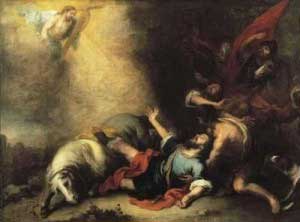 “Paul’s conversion matured in his encounter with the Risen Christ; it was this encounter that radically changed his life. What happened to him on the road to Damascus is what Jesus asks in today’s Gospel: Saul is converted because, thanks to the divine light, “he has believed in the Gospel”. In this consists his and our conversion: in believing in Jesus dead and risen and in opening to the illumination of his divine grace. In that moment Saul understood that his salvation did not depend on good works fulfilled according to the law, but on the fact that Jesus died also for him the persecutor and has risen. This truth by which every Christian life is enlightened thanks to Baptism completely overturns our way of life. To be converted means, also for each one of us, to believe that Jesus “has given himself for me”, dying on the Cross (cf. Galatians 2: 20) and, risen, lives with me and in me. Entrusting myself to the power of hisforgiveness, letting myself be taken by his hand, I can come out of the quicksands of pride and sin, of deceit and sadness, of selfishness and of every false security, to know and live the richness of his love.”( Pope Benedict XVI from address given on January 25, 2009)
“Paul’s conversion matured in his encounter with the Risen Christ; it was this encounter that radically changed his life. What happened to him on the road to Damascus is what Jesus asks in today’s Gospel: Saul is converted because, thanks to the divine light, “he has believed in the Gospel”. In this consists his and our conversion: in believing in Jesus dead and risen and in opening to the illumination of his divine grace. In that moment Saul understood that his salvation did not depend on good works fulfilled according to the law, but on the fact that Jesus died also for him the persecutor and has risen. This truth by which every Christian life is enlightened thanks to Baptism completely overturns our way of life. To be converted means, also for each one of us, to believe that Jesus “has given himself for me”, dying on the Cross (cf. Galatians 2: 20) and, risen, lives with me and in me. Entrusting myself to the power of hisforgiveness, letting myself be taken by his hand, I can come out of the quicksands of pride and sin, of deceit and sadness, of selfishness and of every false security, to know and live the richness of his love.”( Pope Benedict XVI from address given on January 25, 2009)
Tags: catholic, catholic podcast, catholic prayer, cathollc spirituality
This entry was posted on Wednesday, January 25th, 2012 at 12:42 am
You can follow any responses to this entry through the RSS 2.0 feed.
Denver, Colo., Jan 23, 2011 / 07:09 am (CNA/EWTN News).- On Jan. 24, during the Week of Prayer for Christian Unity that runs from Jan. 18-25, Catholics will celebrate the life of St. Francis de Sales. A bishop and Doctor of the Church, his preaching brought thousands of Protestants back to the Catholic fold, and his writings on the spiritual life have proved highly influential.
The paradoxical circumstances of Francis’ birth, in the Savoy region (now part of France) during 1567, sum up several contradictory tendencies of the Church during his lifetime. The reforms of the Council of Trent had purified the Church in important ways, yet Catholics and Protestants still struggled against one another – and against the temptations of wealth and worldly power.
Francis de Sales, a diplomat’s son, was born into aristocratic wealth and privilege. Yet he was born in a room that his family named the “St. Francis room†– where there hung a painting of that saint, renowned for his poverty, preaching in the wilderness. In later years, Francis de Sales would embrace poverty also; but early in his ministry, the faithful chided him for having an aristocratic manner.
In many ways, Francis’ greatest achievements – such as the “Introduction to the Devout Life,†an
innovative spiritual guidebook for laypersons, or his strong emphasis on the role of human love in Christian devotion – represent successful attempts to re-integrate seemingly disparate “worldly†and “spiritual†realities into one coherent vision of life.
Few people, however, would have predicted these achievements for Francis during his earlier years. As a young man, he studied rhetoric, the humanities, and law. He had his law degree by age 25, and was headed for a political career. All the while, he was keeping the depths of his spiritual life – such as his profound devotion to the Virgin Mary, and his resolution of religious celibacy – a secret from the world.
Eventually, however, the truth came out, and Francis clashed with his father, who had arranged a marriage for him. The Bishop of Geneva intervened on Francis’ behalf, finding him a position in the administration of the Swiss Church that led to his priestly ordination in 1593. He volunteered to lead a mission to bring Switzerland, dominated by Calvinist Protestantism, back to the Catholic faith.
Taking on a seemingly impossible task, with only one companion – his cousin – the new priest adopted a harsh but hopeful motto: “Apostles battle by their sufferings, and triumph only in death.” It would serve him well as he traveled through Switzerland, facing many Protestants’ indifference or hostility, and being attacked by wild animals and even would-be assassins.
Some of Francis’ hearers –even, for a time, John Calvin’s protege Theodore Beza– found themselves captivated by the thoughtful, eloquent and joyful manner of the priest who implored their reunion with the Church. But he had more success when he began writing out these sermons and exhortations, slipping them beneath the doors that had been closed against him.
This pioneering use of religious tracts proved surprisingly effective at breaking down the resistance of the Swiss Calvinists, and it is estimated that between 40,000 and 70,000 of them returned to the Church through his efforts. He also served as a spiritual director, both in person and through written correspondence, with the latter format inspiring the “Introduction to the Devout Life.â€
In 1602, Francis was chosen to become the Bishop of Geneva, a position he did not seek or desire. Accepting the position, however, he gave the last twenty years of his life in ongoing sacrifice, for the restoration of Geneva’s churches and religious orders. He also helped one of his spiritual directees, the widow and future saint Jane Frances de Chantal, to found an order with a group of women.
Worn out by nearly thirty years of arduous travel and other burdens of Church leadership, Francis fell ill in 1622 while visiting one of a convent he had helped to found in Lyons. He died there, three days after Christmas that year. St. Francis de Sales was canonized in 1665, and honored as a Doctor of the Church in 1877.
Because of the crucial role of writing in his apostolate, St. Francis de Sales is the patron of writers and journalists. He is also widely credited with restoring, during his own day, a sense of what the Second Vatican Council would later call the “universal call to holiness†– that is, the notion that all people, not only those in formal religious life, are called to the heights of Christian sanctification. – CNA/EWTN News
A Prayer of St. Frances de Sales
Lord, I am yours,
and I must belong to no one but you.
My soul is yours,
and must live only by you.
My will is yours,
and must love only for you.
I must love you as my first cause,
since I am from you.
I must love you as my end and rest,
since I am for you.
I must love you more than my own being,
since my being subsists by you.
I must love you more than myself,
since I am all yours and all in you.
AMEN.
Check out other Discerning Hearts Posts on St. Francis de Sales
[p2p type=”id” value=”2622″]
[p2p type=”id” value=”2286″]
Meditations from the Introduction to the Devout Life by St. Francis de Sales
Tags: catholic, catholic podcast, catholic prayer, cathollc spirituality, doctor of the church, Francis De Sales, introduction to the devout life, spiritual guidebook, st francis de sales
This entry was posted on Tuesday, January 24th, 2012 at 12:09 am
You can follow any responses to this entry through the RSS 2.0 feed.

The First Reading and the Psalm
Jonah 3:1-5, 10
Psalm 25:4-5, 6-7, 8-9
Second Reading 1 Corinthians 7:29-31
The Gospel, Mark 1:14-20
Tags: catholic, catholic podcast, catholic prayer, cathollc spirituality, Fr. Francis Martin
This entry was posted on Friday, January 20th, 2012 at 8:42 pm
You can follow any responses to this entry through the RSS 2.0 feed.
 INVOKING THE GIFT OF UNITY AMONG CHRISTIANS
INVOKING THE GIFT OF UNITY AMONG CHRISTIANS
VATICAN CITY, 18 JAN 2012 (VIS) – The Week of Prayer for Christian Unity, which begins today, was the theme of Benedict XVI’s general audience celebrated this morning in the Paul VI Hall. The Holy Father explained how this initiative has been held annually for more than a century and brings together Christians from Churches and ecclesial communities, who “invoke that extraordinary gift for which the Lord Jesus prayed during the Last Supper: … ‘That they may all be one'”.
The Week of Prayer – established in 1908 by Paul Wattson, founder of an Anglican religious community who later entered the Catholic Church – “is one of the most effective annual expressions … of the impetus which Vatican Council II gave to the search for full union among all Christ’s disciples”, said the Pope. “This spiritual event, which unites Christians from all traditions, increases our awareness of the fact that the unity we strive for cannot result merely from our own efforts; rather, it is a gift we receive and must constantly invoke from on high”.
The texts for this year’s Week of Prayer have been prepared by a group of representatives from the Catholic Church, and from the Polish Ecumenical Council which proposed the theme of “We will all be changed by the victory of our Lord Jesus Christ”. The history of Poland – marked by defeats and victories, by the struggle to end oppression and achieve freedom – led the ecumenical group to reflect more deeply upon what it means to “win” and to “lose”.
In this context the Pope pointed out that, “in contrast to ‘victory’ understood in triumphal terms, Christ shows us a very different way. His victory does not involve power and might. … Christ speaks of victory through love, mutual assistance and boosting the self-esteem of those who are ‘last’, forgotten, excluded. For all Christians, the best expression of such humble service is Jesus Christ Himself, His total gift of self, the victory of His love over death. … We can share in this ‘victory’ only if we allow ourselves to be transformed by God”.
Likewise, “the unity for which we pray requires inner conversion, both shared and individual. But this must not be limited to cordiality and cooperation; we must reinforce our faith in God; … we must enter into the new life in Christ, Who is our true and definitive victory; we must open to one another, accepting all the elements of unity which God has conserved for us; … we must feel the pressing need to bear witness, before the men and women of our time, to the living God Who made Himself known in Christ”.
Tags: catholic, catholic podcast, catholic prayer, cathollc spirituality, christian unity, pope benedict xvi
This entry was posted on Wednesday, January 18th, 2012 at 8:50 am
You can follow any responses to this entry through the RSS 2.0 feed.
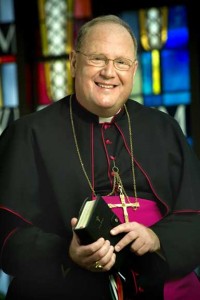 Archbishop Dolan reflects on Saint Josephine Bakhita, a grammar school visit that helped him define human dignity as “God who loves you so much He can’t take his eyes off you,” and the Magna Carta as various means by which the doctrine of the dignity of the human person may be explained.
Archbishop Dolan reflects on Saint Josephine Bakhita, a grammar school visit that helped him define human dignity as “God who loves you so much He can’t take his eyes off you,” and the Magna Carta as various means by which the doctrine of the dignity of the human person may be explained.
Tags: Archbishop Timothy Dolan, catholic, catholic podcast, catholic prayer, cathollc spirituality, grammar school visit, human dignity, Saint Josephine Bakhita, the Magna Carta
This entry was posted on Wednesday, January 18th, 2012 at 12:15 am
You can follow any responses to this entry through the RSS 2.0 feed.
 SAINT ANTHONY THE GREAT OF EGYPT: INSTRUCTIONS AND SAYINGS. Orthodox Christian Icons of St. Anthony. Chant in Greek “Kyrios pimonei”.
SAINT ANTHONY THE GREAT OF EGYPT: INSTRUCTIONS AND SAYINGS. Orthodox Christian Icons of St. Anthony. Chant in Greek “Kyrios pimonei”.
St. Anthony the Great (251- 356), Egyptian saint, one of the great Fathers of the Church. Founder of Christian monasticism, the pinnacle of holy monks. The first desert hermit. Much venerated in Orthodox and Catholic Churches.
His miracle-working relics (body) is kept in Saint-Antoine-l’Abbaye in south-eastern France (since 980, being transferred from Constantinople, there from Alexandria in Egypt). In France, at his relics, St. Anthony’s is credited with assisting in a number of miraculous healings, primarily from ergotism, which became known as “St. Anthony’s Fire”. He was credited by two local noblemen of assisting them in recovery from the disease. They then founded the Hospital Brothers of St. Anthony in honour of him. For century, thousands of deadly sick people flocked to his relics in Saint-Antoine in France for healing.
Tags: catholic, catholic podcast, catholic prayer, cathollc spirituality, Orthodox Christian Icons, st anthony, st. anthony of the desert, st. anthony the great
This entry was posted on Tuesday, January 17th, 2012 at 6:03 am
You can follow any responses to this entry through the RSS 2.0 feed.
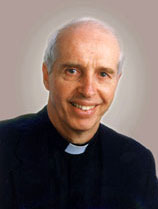 First Reading and Psalm
First Reading and Psalm
1 Samuel 3:3-10, 19
Psalm 40:2, 4, 7-8, 8-9, 10
Second Reading, 1 Corinthians 6:13-15, 17-20
The Gospel, John 1:35-42
Fr. Francis Martin is a renowned Scripture scholar and Professor Emeritus of New Testament at the Dominican House of Studies in Washington, D.C. Fr. Martin is a priest of the Archdiocese of Washington, D.C. where he is also chaplain of the Mother of God Community in Gaithersburg, MD.
Tags: catholic, catholic podcast, catholic prayer, cathollc spirituality, Dominican House of Studies, Fr, Fr. Francis Martin, Francis Martin, gospel of john, Sunday Readings
This entry was posted on Friday, January 13th, 2012 at 8:01 am
You can follow any responses to this entry through the RSS 2.0 feed.

